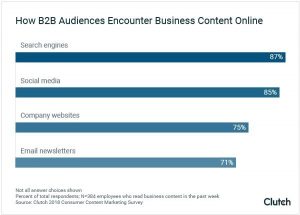SEO Remains an Important Way for B2B Audiences to Find Content
Eighty-seven percent (87%) of B2B audiences find business content online through search engines, according to a new survey from Clutch, a leading B2B research, ratings, and reviews company. B2B audiences also use social media (85%) and companies’ websites (75%) as sources of business-related content online.
Recommended Read: Contextual Content and AI: The New Wingmen for Email Marketing Campaigns
These findings illustrate the value of SEO services, especially content marketing, for businesses looking to engage B2B audiences. Without prominent visibility in search engines, people are less likely to find a company’s website or content.
Technology Topics Are Most Popular on the Search Engines
SEO remains an important way for B2B audiences to find content,” said Kim Moustos, Vice President of Editorial for the Content Marketing Institute.
Read Also: Content Update: Top MarTech Blogs for Every Marketer’s Platter
Clutch’s survey respondents were full- or part-time employees who consumed content online about a business-related topic in the last week. Nearly 90% of these people, referred to in the report as B2B audiences, consume business-related content online at least once a week.
Of the content B2B audiences consume, technology topics are most popular (45%), followed by small business (24%) and workplace/personnel (21%) topics.
Read More: Interview with Jon Lombardo, Global Brand Strategy Lead, LinkedIn
A Broad Content and SEO Portfolio Can Accomplish Multiple Business Goals
Blogs or articles (33%) that provide insight about companies and their products are the preferred content sources for B2B audiences, the survey found. B2B audiences, however, also read reviews (25%) and product descriptions (16%) to learn about companies and their offerings.
To engage B2B audiences through content, businesses should create a diverse content portfolio, said Mike Theodore, Digital Marketing Manager at Digital Third Coast, an Internet marketing and SEO company in Chicago.
“We produce a wide range of content, whether it be social media or content for our own website,” Mike Theodore said.
Recommended Read: Five DIY Activities to Become a B2B Content Rockstar
Mike added, “The goal is to drive organic traffic to our company and our service offerings, to be seen and heard as industry leaders, and to build a level of credibility with prospective employees, clients, and strategic partners.”
Position in the Sales Funnel Determines the Content B2B Audiences Favor
The content B2B audiences consume reflects their position in the conversion funnel.

B2B audiences who consume content to stay informed about business or industry trends (45%) or to learn how to approach a business challenge (16%) tend to be in the “awareness” stage of the conversion funnel. This group is most likely to read blogs or articles (42%).
Read More: Transform Your Marketing Team Into A 3D Organization
Those in the “interest” stage of the conversion funnel prefer to consume content to research a company’s products or services: to learn more before investing or making a commitment. They typically read product descriptions (28%) more often than reviews (27%) or blogs/articles (18%).
When it comes to the bottom of the conversion funnel – the “decision” and “action” stages – nearly one-third (32%) of B2B audiences prefer to read reviews to determine whether a company’s products or services are the best fit for their company.
Businesses can use the survey findings to understand how their audience engages with business content and to inform their content strategy. Clutch’s 2018 Consumer Content Marketing Survey included 384 employees who read business-related content online in the past week.
Currently, Clutch’s methodology compares business service providers and software in a specific market based on verified client reviews, services offered, work quality, and market presence.
Read More: Fierce Pace of Tech Disruption Has Forced Companies to Innovate via M&As












Comments are closed.